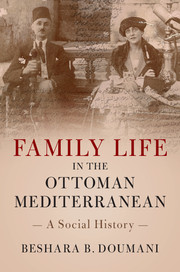Crossref Citations
This Book has been
cited by the following publications. This list is generated based on data provided by Crossref.
elhariry, yasser
and
Talbayev, Edwige Tamalet
2018.
Critically Mediterranean.
p.
1.
Donovan, Joshua
2019.
Agency, Identity and Ecumenicalism in the American Missionary Schools of Tripoli, Lebanon.
Islam and Christian–Muslim Relations,
Vol. 30,
Issue. 3,
p.
279.
Moumtaz, Nada
2019.
Sharia and Kinship in the Ottoman Eastern Mediterranean.
Comparative Studies of South Asia, Africa and the Middle East,
Vol. 39,
Issue. 2,
p.
353.
Stephens, Julia
2019.
Legal History between the Humanities and Social Sciences.
Comparative Studies of South Asia, Africa and the Middle East,
Vol. 39,
Issue. 2,
p.
349.
McPhillips, Stephen
Meier, Astrid
Slim, Souad
and
Bradbury, Jennie
2019.
The Jawz Valley. Reconstructing an Ottoman ‘waterscape’ in Mount Lebanon.
Levant,
Vol. 51,
Issue. 2,
p.
201.
Burak, Guy
2019.
The Historicization of Sharia and Historical Generalization.
Comparative Studies of South Asia, Africa and the Middle East,
Vol. 39,
Issue. 2,
p.
345.
Freitag, Ulrike
2020.
A History of Jeddah.
Heyberger, Bernard
2020.
Préface. Un retour en scène des “Chrétiens d’Orient” (1980-2020).
Les Cahiers d’EMAM,
Tramontana, Felicita
2020.
Geographical mobility and community-building in seventeenth-century Palestine: insights from the records of Bethlehem's Catholic Parish.
Continuity and Change,
Vol. 35,
Issue. 2,
p.
163.
Zencirci, Gizem
2020.
Markets of Islam: performative charity and the Muslim middle classes in Turkey.
Journal of Cultural Economy,
Vol. 13,
Issue. 5,
p.
610.
Tucker, Judith E.
2020.
A Companion to Global Gender History.
p.
399.
Lokot, Michelle
2020.
‘Blood Doesn’t Become Water’? Syrian Social Relations during Displacement.
Journal of Refugee Studies,
Vol. 33,
Issue. 3,
p.
555.
Bishara, Fahad Ahmad
2020.
Histories of law and economic life in the Islamic world.
History Compass,
Vol. 18,
Issue. 4,
Burak, Guy
2021.
Şeyhulislâm Feyzullah Efendi, the Ḥanafī Mufti of Jerusalem and the Rise of the Provincial Fatāwā Collections in the Eighteenth Century.
Journal of the Economic and Social History of the Orient,
Vol. 64,
Issue. 4,
p.
377.
2021.
The Israel-Palestine Conflict.
p.
15.
Abreek-Zubiedat, Fatina
and
Nitzan-Shiftan, Alona
2021.
The right to an urban history: The Gaza Master Plan, 1975–1982.
Environment and Planning D: Society and Space,
Vol. 39,
Issue. 2,
p.
254.
De Bel-Air, Françoise
2021.
BESHARA B. DOUMANI, Family Life in the Ottoman Mediterranean: A Social History (Cambridge: Cambridge University Press, 2017).
Mashriq & Mahjar Journal of Middle East and North African Migration Studies,
Vol. 8,
Issue. 1,
p.
141.
Canbakal, Hülya
and
Filiztekin, Alpay
2021.
Wealth and demography in Ottoman probate inventories: A database in very long-term perspective.
Historical Methods: A Journal of Quantitative and Interdisciplinary History,
Vol. 54,
Issue. 2,
p.
94.
Adiguzel, Fatih Serkant
and
Kuran, Timur
2021.
The Islamic Waqf: Instrument of Unequal Security, Worldly and Otherworldly.
SSRN Electronic Journal ,
Sekulić, Ana
2022.
The Franciscan Order of Things: Empire, Community, and Archival Practices in the Monasteries of Ottoman Bosnia.
Comparative Southeast European Studies,
Vol. 70,
Issue. 4,
p.
642.



